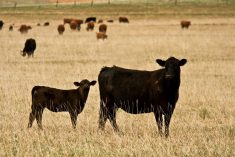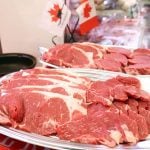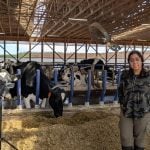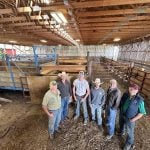Compared to last week, western Canadian yearling markets traded $2-$3 on either side of unchanged and mid-weight feeders (600-850 lbs.) were steady to $2 lower, but calves under 600 lbs. were unchanged to as much as $10 lower.
Prices were quite variable across the Prairies, which made the market hard to define. The market appeared to incorporate a risk discount on calves due to extremely cold temperatures in some regions. There is no doubt weather is influencing buyer sentiment; some auction barns cancelled sales last week. Fleshier feeders experienced larger discounts and buyers were fussier on quality characteristics. In many cases, order buyers were shopping for demand last week as phones were very quiet. The market was actually considered quite sluggish. Friday’s Alberta and Saskatchewan cattle on feed report had feedlot inventories up 20 per cent from the five-year average. Pen space is limited. Western Canadian carcass weights are down about 20 lbs. from year-ago levels so feedlots are not anxious to move fed cattle despite the positive margin structure. Alberta packers were buying fed cattle in the range of $274-$275 on a dressed basis. Feedlot margins are hovering between $40-$60 per head.
Read Also

U.S. grains: Soybeans set 15-month high on U.S.-China trade deal hopes
Chicago soybean futures reached their highest in 15 months on Tuesday, briefly topping $11 a bushel on optimism that the U.S. could reach a trade deal with China as leaders from both countries are expected to meet in South Korea on Thursday.
In central Alberta, larger-frame tan steers with medium flesh weighing 955 lbs. were valued at $192 while mixed steers with medium to heavier flesh levels weighing 845 lbs. were quoted at $189. Black Angus-blended heifers weighing just over 900 lbs. were quoted at $180 in southern Alberta. In Manitoba, mixed medium flesh heifers weighing just under 900 lbs. were valued at $168. In central Saskatchewan, tan mixed steers weighing 760 lbs. were quoted at $199 while similar quality heifers weighing 710 lbs. were valued at $181.
Calves carried a premium in Manitoba where temperatures were not quite as severe. In northern Manitoba, tan steers weighing 674 lbs. were valued at $217 while red mixed heifers weighing 675 lbs. were quoted at $183. Black mixed steers weighing 542 lbs. reached up to $254 while their 510-lb. sisters dropped the gavel at $201. In southern Alberta, black mixed steers weighing 525 lbs. were valued at $226.
The U.S. Department of Agriculture has a very bearish scenario for second-quarter beef production. The managed money long position in feeder cattle futures is near 52-week highs. The upside in feeder futures may be limited because these funds are running out of buying power.
— Jerry Klassen manages the Canadian office of Swiss-based grain trader GAP SA Grains and Produits Ltd. and is president and founder of Resilient Capital, specializing in proprietary commodity futures trading and market analysis. Jerry consults with feedlots on risk management and writes a weekly cattle market commentary. He can be reached at 204-504-8339 or via his website at ResilCapital.com.












